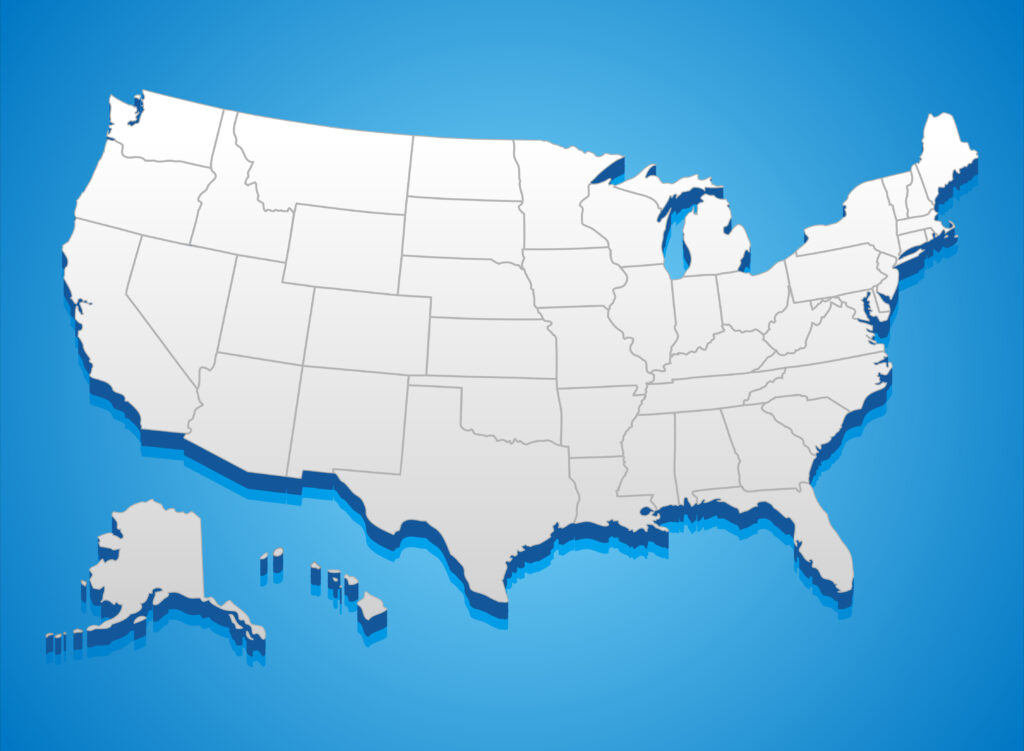Abortion Cases in the Higher Federal Courts
This is Issue 26 of the On Point Series. The most current version of this paper can be found at Abortion Cases in the Higher Federal Courts, On Point 53.
Introduction
The challenged abortion laws that may arrive at the United States Supreme Court in the near future can be divided into three main groups: (I) Limitations on the availability of taxpayer dollars to abortion providers; (II) restrictions on abortion procedures and discriminatory abortions; and (III) health, safety, and informed consent laws.
I. Limitations on the availability of taxpayer dollars to abortion providers.
A. Medicaid: Private Right of Action and Free Choice of Provider
In recent years, states have enacted laws or taken administrative actions that disqualified abortion providers from participation in their Medicaid programs. When challenging these state laws, abortion providers have raised two interdependent claims in litigation: (1) that Medicaid recipients have a private right of action to challenge a state’s disqualification of a Medicaid provider in court; and (2) that the laws violate federal law, specifically the Medicaid statute’s “free choice of provider” provision.[1]
The Fifth, Sixth, Seventh, Ninth, and Tenth Circuit Courts have held that §1396a(a)(23)(A) of the federal Medicaid statute confers a private right of action, enabling Medicaid recipients to sue. Only the Eighth Circuit held that such a right does not exist.[2] Further, the Fifth, Seventh, Ninth, and Tenth Circuit Courts[3] have held that terminations of abortion providers from Medicaid programs violate the Free Choice of Provider provision.
Within days, the U.S. Supreme Court may decide if they will hear cases challenging laws in Louisiana[4] and Kansas,[5] from the Fifth and Tenth Circuits, respectively, and settle the question of whether Medicaid recipients have a private right of action to challenge in court a state’s disqualification of a Medicaid provider.
Meanwhile, the Fourth Circuit will likely consider this question soon. A trial court in South Carolina granted a preliminary injunction against South Carolina’s termination of abortion providers from the state Medicaid program in Planned Parenthood South Atlantic v. Baker.[6] The court held that the plaintiffs have a private right of action and the termination violates the Medicaid Free Choice of Provider provision.
B. General Funding Restriction
The full Sixth Circuit is reviewing a trial court decision enjoining an Ohio law that prevents the Ohio Department of Health from using funds from six non-abortion-related federal health programs to contract with abortion providers and their affiliates. In Planned Parenthood of Greater Ohio v. Hodges, the trial court held that the law violates the First and Fourteenth Amendments.[7]
II. Restrictions on Abortion Procedures and Discriminatory Abortions.
A. 2nd-Trimester Dismemberment (D&E) Acts
Restrictions on second-trimester Dilation and Evacuation abortions (D&E), also known as dismemberment abortions, have been enacted in nine states. Two are presently before U.S. Circuit Courts. The Fifth Circuit will evaluate the constitutionality of an enjoined Texas act in Whole Woman’s Health v. Paxton.[8] The Eighth Circuit will similarly consider the constitutionality of an Arkansas act in Frederick W. Hopkins, M.D., M.P.H. v. Larry Jegley, et al.[9]
In August 2018, the Eleventh Circuit held that the Alabama act was unconstitutional in W. Ala. Women’s Ctr. v. Williamson.[10] The state may appeal that decision to the United States Supreme Court.
Similar acts are enjoined or are otherwise not in effect in: Kansas (enjoined and waiting for ruling from the state Supreme Court); Kentucky (trial date set; state agreed not to enforce prior to ruling); Oklahoma (temporarily enjoined by state court); and Louisiana (trial date set; state agreed not to enforce prior to ruling).
In Mississippi and West Virginia, dismemberment acts are in effect and have not been challenged.
B. Discriminatory Abortion Bans
Twelve states have enacted bans on the performance of abortion based on the sex of the unborn child, the child’s race, and/or the presence of a genetic anomaly.
In Preterm-Cleveland v. Himes, the Sixth Circuit is presently considering a lower court injunction on an Ohio ban on abortions of unborn infants diagnosed with Down Syndrome.[11] In Planned Parenthood of Indiana v. Commissioner of the Indiana State Department of Health, Indiana is asking the United States Supreme Court to review and reverse a Seventh Circuit decision[12] holding that a ban on abortions based on the unborn child’s race, sex, or disability is unconstitutional.[13]
III. Health, Safety, and Informed Consent Laws.
A. Admitting Privileges or Arrangements
In June Medical Services L.L.C. v. Gee, the Fifth Circuit upheld a Louisiana law that requires an abortion provider to have admitting privileges at a hospital within 30 miles of his or her practice (plaintiffs are seeking a rehearing of the case by the full Fifth Circuit).[14] The court distinguished the challenged Louisiana law from the Texas law invalidated by the United States Supreme Court in Whole Woman’s Health v. Hellerstedt,[15] stating that the law creates a “dramatically” smaller impact in Louisiana than the law in Texas did there.[16]
Similarly, in Comprehensive Health of Planned Parenthood Great Plains v. Hawley, the Eighth Circuit vacated a lower court decision enjoining a Missouri law that requires abortion providers to have authorization to perform surgery at a hospital within 15 minutes of their practice, and contains physical requirements for abortion facilities, which can be waived upon request.[17] The case has been returned to the lower court for more fact finding to determine if the law creates an undue burden on abortion access.
Conversely, in EMW v. Glisson, a trial court permanently enjoined a Kentucky law that required abortion clinics to maintain written “transfer agreements” with a licensed acute care hospital and written “transport agreements” with a licensed ambulance service. The court held that the required agreements violated the plaintiffs’ substantive due process rights under the Fourteenth Amendment to the U.S. Constitution.[18] This decision may be appealed to the Sixth Circuit.
B. Chemical Abortion Regulation
A challenged Arkansas law that requires a chemical abortion provider to have a signed contract with a physician who agrees to handle complications, and who has active admitting privileges and gynecological/surgical privileges at a hospital designated to handle any emergencies associated with abortion-inducing drugs, has bounced from trial court, to the Eighth Circuit, and has been denied review in the U.S. Supreme Court.
Most recently, a trial court preliminarily enjoined the state from imposing any civil or criminal penalties on the plaintiffs for failure to comply with the law, as long as the plaintiffs attempt to comply.[19] Litigation continues, and the case will likely return to the Eighth Circuit, and potentially the U.S. Supreme Court. Litigation over a similar law in Missouri has been stayed pending the outcome of the Arkansas case.[20]
C. Mandatory Ultrasound and/or Reflection Periods
The Sixth Circuit will soon consider whether a Kentucky law requiring abortion providers to perform an ultrasound prior to an abortion, display and describe the ultrasound images, and make audible the fetal heartbeat violates the First Amendment of the U.S. Constitution by compelling ideological speech. In EMW Women’s Surgical Ctr., P.S.C. v. Beshear, a trial court enjoined the law.
The Seventh Circuit affirmed the injunction of an Indiana law requiring an 18-hour reflection period after an ultrasound before a woman may obtain an abortion. The state may ask the U.S. Supreme Court to review this case, Planned Parenthood of Ind. & Ky., Inc. v. Comm’r of the Ind. State Dep’t of Health.[21]
D. Parental Involvement
The Eleventh Circuit is considering the appeal of a trial court decision enjoining a law which modified the judicial proceedings required for a minor to bypass a parental consent requirement in Alabama.[22]
Mary E. Harned, J.D. is an associate scholar for the Charlotte Lozier Institute.
[1] 42 U.S.C. § 1396a(a)(23).
[2] Planned Parenthood of Kan. v. Andersen, 882 F.3d 1205, 1224-29 (10th Cir. 2018) (holding § 1396a(a)(23) creates a private right of action); Planned Parenthood of Gulf Coast, Inc. v. Gee, 862 F.3d 445, 457-62 (5th Cir. 2017) (same); Planned Parenthood Ariz. Inc. v. Betlach, 727 F.3d 960, 965-68 (9th Cir. 2013) (same); Planned Parenthood of Ind., Inc. v. Comm’r of Ind. State Dep’t of Health, 699 F.3d 962, 972-77 (7th Cir. 2012) (same); Harris v. Olszewski, 442 F.3d 456, 460-65 (6th Cir. 2006) (same). Contra Does v. Gillespie, 867 F.3d 1034, 1039-45 (8th Cir. 2017) (holding § 1396a(a)(23)(A) does not create a private cause of action).
[3] Andersen, 882 F.3d at 1229-36; Gee, 862 F.3d at 462-68; Betlach, 727 F.3d at 968-74; Comm’r of Ind., 669 F.3d at 977-80.
[4] Gee v. Planned Parenthood of Gulf Coast Inc., Docket 17-1492; 876 F.3d 699 (5th Cir. 2017) (en banc rehearing denied); 862 F.3d 445 (5th Cir. 2017). Another case addressing the same questions is pending in the Fifth Circuit. Texas is appealing a trial court decision enjoining the termination of Planned Parenthood from the Texas Medicaid program. Planned Parenthood of Greater Tex. Family Planning & Preventive Health Servs. v. Smith, 236 F. Supp. 3d 974 (W.D. Tx. 2017).
[5] Andersen v. Planned Parenthood of Kansas and Mid-Missouri, Docket 17-1340; 882 F.3d 1205 (10th Cir. 2018) (preliminary injunction affirmed in part, vacated in part; case remanded); 2016 U.S. Dist. Lexis 86948 (D. KS. 2016) (preliminary injunction granted).
[6] 2018 U.S. Dist. Lexis 146189 (D. SC. 2018).
[7] 201 F. Supp. 3d 898 (S.D. OH. 2016); affirmed, Planned Parenthood of Greater Ohio v. Himes, 888 F.3d 224 (6th Cir. 2018); Vacated by, Rehearing, en banc, granted by Planned Parenthood v. Himes, 892 F.3d 1283 (6th Cir. 2018).
[8] 280 F. Suppl. 3d 938 (W.D. TX. 2017).
[9] 267 F. Supp. 3d 1024 (E.D. AR. 2017). This case also challenges provisions that require abortion providers to seek patients’ medical records, dispose of fetal remains in a humane manner, and disclose information about minors’ abortions to law enforcement.
[10] 2018 U.S. App. Lexis 23556 (11th Cir. 2018).
[11] 294 F. Supp. 3d 746 (W.D. OH. 2018).
[12] 2018 U.S. App. Lexis 17676 (7th Cir. 2018).
[13] This case also challenges a provision that requires the humane disposal of fetal remains.
[14] 2018 U.S. App. Lexis 27498 (5th Circ. 2018).
[15] 136 S. Ct. 2292 (2016).
[16] Gee at 3.
[17] 2018 U.S. App. LEXIS 25545 (8th Cir. 2018).
[18] Civil Action No. 3:17-cv-00189-GNS (W.D. KY. 2018).
[19] Planned Parenthood Arkansas & E. Okla. v. Jegley, 2018 U.S. Dist. LEXIS 110358, at 227 (E.D. AR. 2018).
[20] Comprehensive Health of Planned Parenthood Great Plains v. Williams, No. 17-4207-CV-C-BP.
[21] 896 F.3d 809 (7th Cir. 2018).
[22] Reproductive Health Services, et al. v. Marshall, 268 F. Supp. 3d 1261 (M.D. AL 2017).



























